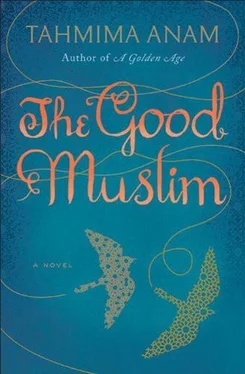‘Did you get everything?’ Ammoo asked. Her voice was down to a whisper, chalk in the dust.
‘I did.’
‘I need the toilet. Call Sufia.’
‘She’s washing the pots. I’ll take you.’
Ammoo didn’t have the strength to protest. Maya slid an arm under her shoulders, and with a soft grunt Ammoo sat upright. She held up her hand. ‘Wait,’ she said. She caught her breath. Swung her legs over the side of the bed. Waved to Maya to hold out her arm so she could stand up. Together they shuffled to the hallway.
‘Keep the door unlocked,’ Maya said. She heard the water running, and then a slap against the wall and the sound of retching. ‘Are you all right, Ma? Let me come in.’
She didn’t hear anything. ‘Ma? Let me come in, Ma, please.’ Still nothing. She pushed the door open and found Ammoo lying beside the toilet, her arm over her face. Maya tried to lift her up. Her cheek and chin were coated in vomit. Maya poured a mugful of water over her, and then another. Ammoo lay very still, opening her eyes against the cool splash of water. The sounds of the garden came through the small bathroom window. Maya peeled away Ammoo’s sari and placed it in the washing bucket. Ammoo lifted her head. They inched their way back to the bed. Ammoo mouthed something and Maya came close, trying to understand.
‘Everything,’ she said softly, ‘did you get everything?’
‘Don’t worry, Ma,’ Maya replied. ‘Eid will be just like it always is.’
Shafaat rang, excited. ‘We’ve been getting letters about your column,’ he said. ‘People like it.’
She didn’t care if people liked it. Did they understand it? ‘Yes,’ he said, ‘your message is certainly getting across. We had a letter from the Khatib of Rajshahi Mosque. An upstanding fellow, apparently.’
‘Is it threatening?’ She didn’t care for herself, only for the people of the village, for Nazia.
He told her not to worry. Static through the receiver as he blew smoke out of the corner of his mouth. All right, then. She would keep on writing.
Travelling through the rugged south of the country, I found myself among the Hill tribes, the Garo and the Chakma. Ask yourself, citizen, have you ever met a tribal? Ever sat next to one at school? Ever known anyone who knows anyone who has a tribal for a friend? I thought not.
They know the medicine of the forest. Plants that you soak and paste over a wound. They chew the leaf and smear it over your cut. There is a treasure, they say, in every inch of this land.
In exchange, we raze their villages and let the army rape their women. We take their forests and smoke them out of their villages. This is no kind of freedom.
*
Ammoo grew weaker every day. The change was hardly perceptible, but occasionally Maya would notice something, the angle of her cheekbones, the sleek profile she had acquired. She tried to monitor other things — her eating, her bowel movements, the vomiting from chemotherapy. But Ammoo remained scrupulously private, refusing to talk openly about her disease, always preferring Sufia’s help to hers. She was so careful to obscure the details of the cancer that Maya began to wonder if she should be there at all.
But she couldn’t imagine being anywhere else. Her time away had dissolved, like sugar in water, leaving no imprint. She rarely thought of Nazia and whether she might call again. The season of mangoes had come and gone in Rajshahi, and she might have spent a few moments remembering the currents of scent that blew into the village and made everyone’s mouth water, but she didn’t. She thought only of Ammoo, only of banishing the premonition. She was a regular visitor upstairs, sitting on the fringes of their strange world, transfixed by its rituals, the air of calm and certainty that surrounded them. She once asked Rokeya what she thought of President Zia’s death, and Rokeya looked at her blankly as though unaware of which Zia she meant. Was there a Zia in the Qur’an, she saw her wondering. A Zia in their extended family? But instead of experiencing the familiar surge of anger, instead of repeating her usual lines — about citizens who do not deserve the freedom they had fought so hard to gain, about how they deserve their dirty politicians, and about how it was people like her who had brought all of this upon the country — Maya found herself relieved. She was tired of letting everything break her heart, the politicians and crooks and the women whose babies died because they didn’t make it to the hospital on time. This was a world in which it didn’t matter that two of their presidents had been assassinated, and that they were now fully in the throes of irony, with their very own Dictator, their own injustices, their own dirty little war down south. There was just this room, this hot room with its stink of men and its stink of women, and the feeling that she was pulling the end of a rope with all her weight, pulling her mother back as she careened towards death.
Zaid forgave Maya for the incident in the market, and came and went as usual. As before, she fed him and tried to teach him things. Halal things, no card games, no television. She was working on addition and subtraction. His frenzied energy was the only bright thing in the bungalow. He tiptoed into Rehana’s room and sat at her feet, radiating a sort of brisk optimism, no matter that she was sinking into the mattress, that she was as frail as a bird in its nest, a trembling, bruise-breasted robin.
Even after Sohail declared his love for the Holy Book, after he started making trips to the mosque and wearing a cap on his head, Maya still thought she could persuade her brother to change his mind. She had known him all her life, and all her life he had been the opposite of a religious man. He had laughed and joked about it, and he had been angry at a religion that could be so easily turned to cruelty. He had seen it with his own eyes, the boys butchered because they were Hindu, the university teachers shot and piled into graves because they weren’t considered Islamic enough. For all these reasons Maya believed Sohail’s conversion was fragile, like the dew that settled between the grasses at the start of the day, gone by the time the afternoon sun vanished into dusk.
She decided to throw him a birthday party. All the old friends would come — Chottu, Saima, Iqbal, the boys from his regiment, their friends from university. The ones who had heard Sohail’s speeches at the student union, the ones who had voted him president of his hall and heard his name ringing in their throats when they joined up.
When the day arrived, she ignored Ammoo’s advice and said little to Sohail about the party, informing him only that it would take place in the afternoon, and that he would be expected to be there. It was his birthday, after all. She worked hard, setting up the Carrom board on the verandah and squeezing lemons by the dozen and frying lentils for a vast pot of khichuri.
The day was bright and hot, not a hint of a monsoon spoiler. Chottu and Saima arrived first, carrying their newborn baby in a katha they had stitched in the colours of the Bangladesh flag. ‘Have you decided on a name?’ she asked, knowing that Chottu’s mother was superstitious, and that she had forbidden them to name the child before her three-month naming ceremony.
‘No,’ Saima said, ‘the dragon still hasn’t given us permission.’
Chottu said, ‘I keep telling this kid how lucky she is to be born in a free country, but all she does is fart and eat, eat and fart.’
Some of the boys in Sohail’s regiment sauntered in, dressed in their army uniforms. Kona, the one whose shoulders filled his uniform most handsomely, gave her a brief salute. ‘Hello, little sister,’ he said. ‘Not so little any more, I see.’
Читать дальше












